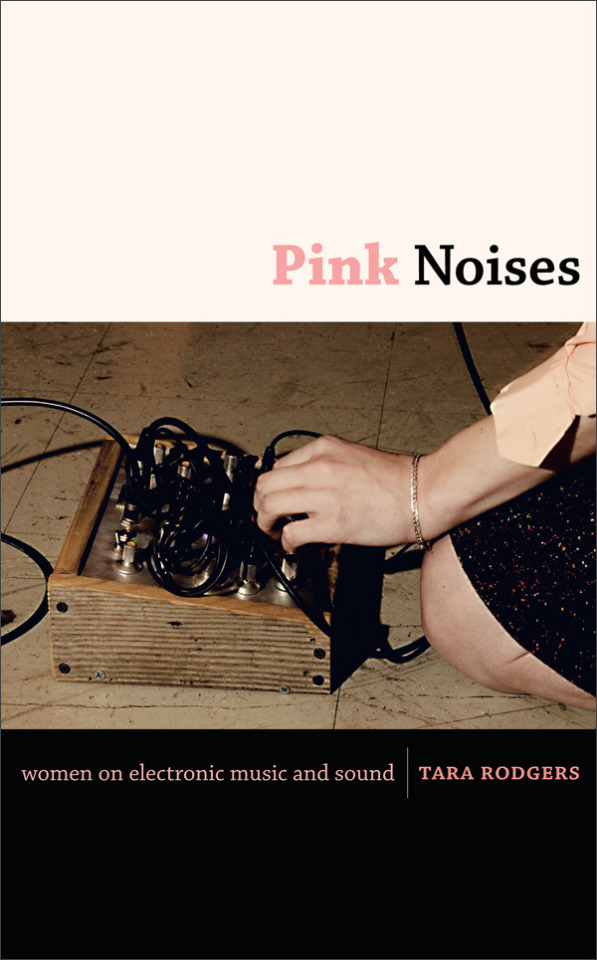#tara rodgers
Explore tagged Tumblr posts
Text

Pink Noises: Women on Electronic Music and Sound by Tara Rodgers
Get it from my Google Drive HERE
Pink Noises brings together twenty-four interviews with women in electronic music and sound cultures, including club and radio DJs, remixers, composers, improvisers, instrument builders, and installation and performance artists. The collection is an extension of Pinknoises.com, the critically-acclaimed website founded by musician and scholar Tara Rodgers in 2000 to promote women in electronic music and make information about music production more accessible to women and girls. That site featured interviews that Rodgers conducted with women artists, exploring their personal histories, their creative methods, and the roles of gender in their work. This book offers new and lengthier interviews, a critical introduction, and resources for further research and technological engagement.
Contemporary electronic music practices are illuminated through the stories of women artists of different generations and cultural backgrounds. They include the creators of ambient soundscapes, “performance novels,” sound sculptures, and custom software, as well as the developer of the Deep Listening philosophy and the founders of the Liquid Sound Lounge radio show and the monthly Basement Bhangra parties in New York. These and many other artists open up about topics such as their conflicted relationships to formal music training and mainstream media representations of women in electronic music. They discuss using sound to work creatively with structures of time and space, and voice and language; challenge distinctions of nature and culture; question norms of technological practice; and balance their needs for productive solitude with collaboration and community. Whether designing and building modular synthesizers with analog circuits or performing with a wearable apparatus that translates muscle movements into electronic sound, these artists expand notions of who and what counts in matters of invention, production, and noisemaking. Pink Noises is a powerful testimony to the presence and vitality of women in electronic music cultures, and to the relevance of sound to feminist concerns.
Interviewees: Maria Chavez, Beth Coleman (M. Singe), Antye Greie (AGF), Jeannie Hopper, Bevin Kelley (Blevin Blectum), Christina Kubisch, Le Tigre, Annea Lockwood, Giulia Loli (DJ Mutamassik), Rekha Malhotra (DJ Rekha), Riz Maslen (Neotropic), Kaffe Matthews, Susan Morabito, Ikue Mori, Pauline Oliveros, Pamela Z, Chantal Passamonte (Mira Calix), Maggi Payne, Eliane Radigue, Jessica Rylan, Carla Scaletti, Laetitia Sonami, Bev Stanton (Arthur Loves Plastic), Keiko Uenishi (o.blaat)
#book#tara rodgers#annea lockwood#pamela z#le tigre#ikue mori#Pauline Oliveros#Pink Noises: Women on Electronic Music and Sound
549 notes
·
View notes
Audio
nem láttam az emailed
0 notes
Photo

83 notes
·
View notes
Text
Rodgers: On the process and aesthetics of sampling in electronic music production
full text (pdf, possibly paywall)
This 2003 article by Tara Rodgers is broad defense of sampling as a field of musical expression. Rodgers identifies sampling as folk and Afrodiasporic traditions of quotation meeting the sound-transformation of musique concrète. She goes on to falsify the common assumptions that sampling represents theft in place of creativity or automation in place of performance. A sampler is like any other instrument in that its performance can be expressive and its technique deep; a sample is like any other sound in that it can be selected for its conceptual weight or aesthetic character.
Rodgers offers a few examples: Le Tigre using samples for their semantic content and evocation of a time and place; Matmos forging a conceptual unity between surgeon and patient, producer and sound. She challenges the notion that sampling represents a fetishism of technology or a poverty of ideas: glitch music explores the unintended behaviors of technology; a lo-fi approach to sampling can reject the pristine or expensive as a political statement.
She also makes the point that sampled music is ripe for social analysis. Woven into the article is a feminist critique of the particularly male-dominated house genre and the double standard for female producers working with a glitch or lo-fi aesthetic.
I'd say time has only validated Rodgers’s point of view; hip hop and EDM have ascended to pop ubiquity. Automation is still in question; jokes abound about DJs who don’t do anything on stage. On the appropriation side, the occasional high profile lawsuit is pretty universally understood to be total bullshit; they persist because money, apathy. More troubling are the blocking and takedowns over copyright happening on YouTube and Twitch. Certainly the reckoning with samplers isn’t over.
0 notes
Video
vimeo
INSERT [ ] HERE | Sharon Mansur & Tara Rodgers
0 notes
Link
Here is a link to the website of musician, composer, and feminist technology scholar Tara Rodgers (Analog Tara). She is also Assistant Professor of Women’s Studies and Faculty Fellow in Digital Cultures & Creativity at the University of Maryland, where she coordinates the Women’s Studies Multimedia Studio, as well as the author of Pink Noises: Women on Electronic Music and Sound (Duke UP), which grew out of the online community Rodgers founded in 2000. The old Pinknoises.com website is archived here. Pink Noises is also on Facebook, and Analog Tara is on Tumblr and Soundcloud.
http://soundcloud.com/analogtara
#tara rodgers#artists#links#feminism#her noise#pink noise#Pink Noises: Women on Electronic Music and Sound
0 notes